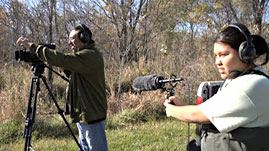Teachers' Domain - Digital Media for the Classroom and Professional Development
User: Preview

Source: A Haskell Indian Nations University production for NASA's Where Words Touch The Earth



This video segment features Native student filmmakers as well as Elders talking about climate change. It begins with the student filmmakers explaining the meaning behind the film project, Where Words Touch the Earth, and why their involvement matters. Native Elders then share some of their observations of how climate has changed and the sense of responsibility Native people share not to stand idly by in the face of change. The video segment was adapted from a student video produced at Haskell Indian Nations University in Lawrence, Kansas.
Climate change is a global issue, with consequences not just for humankind but for all living things. The traditional Native ways of understanding and relating to the world, which have been shaped by a holistic understanding of the Earth system, hold valuable lessons for those willing to listen—and, in this case, watch. This video segment features student filmmakers from Haskell Indian Nations University. Their film project, titled Where Words Touch the Earth, is a vehicle to share indigenous wisdom with other Native students and with the broader population who view their work.
As a Native people, we should be more involved with [climate change] because we were taught in the old ways to respect the land and to respect the Earth. We come from these elements. – Rashay Castillo
American Indians lead their lives closely connected with nature—spiritually, culturally, and emotionally. In a warming world, Native people see changes in plants, animals, and weather that many non-native people who have lost their connection with nature cannot.
We are the ones that can provide the information that affects us specifically, but our people need to hear it from us. – Marei Spaola
Although there is a lot of discussion globally about climate change, Native people feel that they benefit from hearing information and ideas on the subject from members of their own community—people who can speak to their experiences and perspectives. Elders have been saying for some time that the planet is "burning up." Their evidence is based on practical experience that comes from living as one with nature. Native people understand nature as a collection of gifts, not resources. Their survival depends, as one Elder in the film puts it, on "giving back" to Mother Earth and thanking her for these gifts.
Global warming affects us all…. We get a chance to show our perspective—the spiritual, cultural, and emotional ties to the land and the creatures on the Earth. – Rayleene Elliott
Like the Elders, Native youth faced with the potential consequences of global warming are concerned for their families and communities. This project challenged the student filmmakers to raise awareness among a broader population, many of whom may not recognize what is happening around them. In other words, it was an opportunity to tell a story about what's happening and to have the words and images they captured "touch the Earth" and make a difference.
 Loading Standards
Loading Standards Teachers' Domain is proud to be a Pathways portal to the National Science Digital Library.
Teachers' Domain is proud to be a Pathways portal to the National Science Digital Library.
